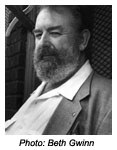| Triumph of the City | |
| by Michael Moorcock | |
 There is a famous photograph, popular during World War II, of a London bookshop. The shelves are eight tiers high. The proprietor is on a ladder, rearranging volumes. The customers are scanning the stock, browsing, reading, paying for their choices at a temporary counter. There is a familiar serenity about the picture. Oblivious of the camera, customers are deeply engrossed in their reading. A perfectly normal bookselling morning.
There is a famous photograph, popular during World War II, of a London bookshop. The shelves are eight tiers high. The proprietor is on a ladder, rearranging volumes. The customers are scanning the stock, browsing, reading, paying for their choices at a temporary counter. There is a familiar serenity about the picture. Oblivious of the camera, customers are deeply engrossed in their reading. A perfectly normal bookselling morning.
The only abnormality is that the shop has very little roof left, large parts of walls are now rubble strewn across the floor, fragments of glass are everywhere. Customers blow dust off their books before they read the titles. A piece of cardboard has been pulled from the wreckage and on it, written in a firm hand, is a single word: OPEN.
The shop had of course been V-bombed. Defiantly, in the spirit that became famous in America thanks to the brave reporting of Ed Sullivan & Co., London was carrying on as usual. London, said Sullivan, could take it. Our civilization and way of life was valued not only in spite of the Nazi bombs, but in some senses because of them.
It meant a great deal to civilian Londoners when Americans responded with characteristic generosity and sympathy, supporting our courage as we are now able to celebrate theirs.
 During the Blitz and the years immediately following, booksellers noted a new seriousness in readers, a general questioning. Escapism, of course, was popular, but people also developed a profound thirst for substantial fiction and nonfiction. Penguin Books, for instance, sold in unprecedented numbers.
During the Blitz and the years immediately following, booksellers noted a new seriousness in readers, a general questioning. Escapism, of course, was popular, but people also developed a profound thirst for substantial fiction and nonfiction. Penguin Books, for instance, sold in unprecedented numbers.
Our Russian allies called their great cities "hero cities" and the British awarded the brave people of the Island of Malta their highest civilian honor, the George Cross, for their extraordinary defense of their country.
Now New York has become a "hero city," not simply because of the assault she sustained, but for the spirit with which she met it. This heroic status becomes part of a city's history. Part of her pride. Part of her sorrow. Part of her cultural understanding of the world. It is subtle credit she can draw on. This particular spirit I celebrated in my 1988 novel Mother London, and I continue to applaud in my new novel King of the City.*
 I'm dismayed by totalitarian consumerism and its endemic imperialism, which is the main subject of King of the City. I am in my bones an egalitarian, a populist democrat. Diversity is our lifeblood. Growing up in that heavily bombed London neighborhood, my daily experience gave me a firm faith in public common sense. My early exposure to people at their very best still informs my work.
I'm dismayed by totalitarian consumerism and its endemic imperialism, which is the main subject of King of the City. I am in my bones an egalitarian, a populist democrat. Diversity is our lifeblood. Growing up in that heavily bombed London neighborhood, my daily experience gave me a firm faith in public common sense. My early exposure to people at their very best still informs my work.
I have had many opportunities to experience the strength and diversity of popular democracy in other countries. I have lived in places without popular democracy. I know for sure what generally delivers the best quality of life to the greatest number of us.
As past nationalism gives way to a 21st-century notion of tolerant multiculturalism, our common enemy remains, as always, the kind of murderous bigotry that drove the Nazis and now drives our new attackers. Our best weapon against bigotry, at home and abroad, still remains the vast breadth of choice exemplified in our free press.
Human virtue manifests itself in many forms, but one thing is very clear: The virtues that unite us are stronger than the vices which divide us. New York demonstrated that.
 They say it's a shame people can't behave like heroes all the time, that it takes a crisis to bring the best out of them. But I'm rather glad we aren't always at our best. Few of us want to lead permanently stimulated lives. Mostly, we want time for the ordinary pleasures, including family gatherings, movies, music, books and political arguments.
They say it's a shame people can't behave like heroes all the time, that it takes a crisis to bring the best out of them. But I'm rather glad we aren't always at our best. Few of us want to lead permanently stimulated lives. Mostly, we want time for the ordinary pleasures, including family gatherings, movies, music, books and political arguments.
During the Blitz, we children hardly realized we were ever in danger. Our parents took the flack. I scarcely remember a second of fear, even as we sheltered in subways and basements. Nightly air-raids and rockets removed buildings, friends, relatives, and neighbors as if they had never existed, yet the survivors remained humorous, irreverent, clever and good-hearted. The dead were remembered with unspoken respect.
Of course it was not merely defiance that kept them going -- it was their enormous courage, daily displayed in extraordinary and unexpected ways.
They were demonstrating how their curiosity could not be crushed, how intellect, humor, imagination, and a love of learning, in whatever language or faith, are never permanently threatened by terror. Ultimately, the human spirit is only made greater and stronger by brute aggression. No matter what we have all been through in our fairly bloody history, our humanity inevitably triumphs over violence and fanaticism.
There have been occasions in my life when I have not been especially proud to be British, but there's rarely been a time when I haven't been proud to be a member of the human race.
 Following the New York and Washington attacks, I felt this same enormous surge of pride in my fellow men and women. The atrocity displayed the terrible grief a few deranged megalomaniacs can visit on the majority, but what it finally demonstrated was how our common virtues rise instinctively above cruel devastation.
Following the New York and Washington attacks, I felt this same enormous surge of pride in my fellow men and women. The atrocity displayed the terrible grief a few deranged megalomaniacs can visit on the majority, but what it finally demonstrated was how our common virtues rise instinctively above cruel devastation.
With a little more resolution than normal, life goes on. The publishers still publish. Civil issues are still vigorously, even aggressively, debated. Every shade of opinion is still offered to the public. Hard facts and wild theories are still examined. The readers still read and have enthusiasms. Our books, in all their variety, remain available on their shelves. The bookstores, in all their variety, stay open. We don't merely survive in adversity, we flourish. And quietly, like the customers in that blitzed bookstore, we triumph.
King of the City
* A November/December 2001 Book Sense 76 pick
Moorcock's second love letter to the city of his birth. It's funny, hip and pure nostalgia, written in a dreamy prose that draws the reader right in. Denny Dover is a rock-guitarist-cum photojournalist-who has seen it all and is distressed at the rapid disappearing act of his old London. He witnesses the rise of a childhood chum to billionaire laying waste to the soul of the city while he and his cousin futilely attempt to stop him. A wonderful novel.
- John Barton, BookPeople Bookstore, Austin, TX
 Michael Moorcock has published more than seventy novels, (such as The Cornelius Chronicles, Elric, Fabulous Harbours, and Tales from the Texas Woods), and there are more than twenty million copies of his books in print worldwide. Among the major literary prizes Moorcock has received are the Guardian Fiction Prize and the Nebula Award. He and his wife divide their time between homes in London, Texas, and Spain.
Michael Moorcock has published more than seventy novels, (such as The Cornelius Chronicles, Elric, Fabulous Harbours, and Tales from the Texas Woods), and there are more than twenty million copies of his books in print worldwide. Among the major literary prizes Moorcock has received are the Guardian Fiction Prize and the Nebula Award. He and his wife divide their time between homes in London, Texas, and Spain.
Another author photo by Beth Gwinn.
